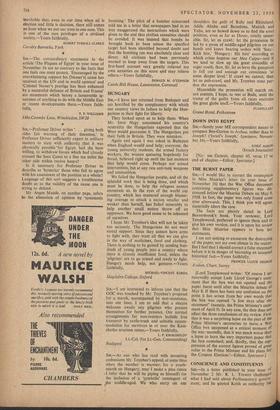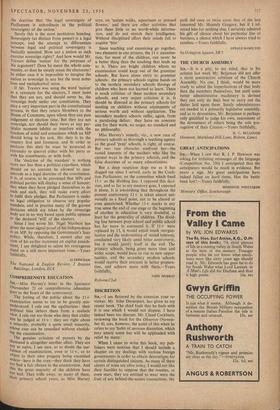CONSCIENCE AND CONSTITUENTS
SIR,—In a letter published in your issue tir, November 2 Mr. R. L. Travers challenged what I had said about Parliamentary govern- ment; and he quoted Keith as authority for
the doctrine that 'the legal sovereignty of Parliament is subordinate to the political sovereignty of the nation,' Surely this is the most pernicious humbug. Sovereignty (as distinct from power) is a legal concept, and the attempt to differentiate between legal and political sovereignty is basically unsound. How can a nation as such exercise sovereign rights? And how would Mr. 'Travers define 'nation' for the purposes of his argument? Does he mean the whole com- munity, or does he simply mean the electorate? In either case it is impossible to imagine the nation as sovereign in any but the most nebu- lous and metaphorical sense.
If Mr. Travers was using the word 'nation' as a synonym for the, electors, I must insist that they are not, and should never be, the sovereign body under our constitution. They Play a very important part in the constitutional process, in that they return Members to the House of Commons, upon whom they can pass judgement at election time.' But they are not sovereign, nor should their views at any par- tieular moment inhibit or interfere with the freedom of mind and conscience which an MP should bring to his task. His duty is to the country first and foremost, and in order to Perform this duty he must be prepared in extremity to quarrel either with his party or with his constituents, or with both.
The 'doctrine of the mandate' is nothing more nor less than a political expedient, which should on no account be allowed to mas- querade as a legal doctrine of the constitution. It is, of course, to be presumed that MPs and Political parties will display a sense of honour; that when they have pledged themselves to do such and such, they will make every effort to fulfil their pledges. But Parliament is under no legal obligation to observe any popular Mandate, and in practice many of the gravest decisions which are taken by the sovereign body are in no way based upon public opinion or the declared 'will' of the electors.
Since I last wrote Mr. Nigel Nicolson has given the most signal proof of his independence as an MP, by opposing the Government's Suez Policy, While, therefore, 1 cannot alter my view of his earlier statement on capital punish- ment, I am delighted to salute his courageous stand on a still more important issue.—Yours faithfully,
ALTRINCHAM
The National & English Review, 2 Breams Buildings, London, EC4











































































 Previous page
Previous page